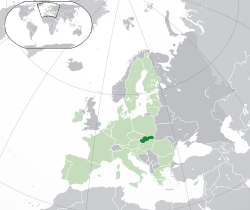| Name | Industry | Sector | Headquarters | Founded | Notes | Status |
|---|
| | |
|---|
| Air Slovakia | Consumer services | Airlines | Bratislava | 1993 | Airline, defunct 2010 | P | D |
| Doprastav | Industrials | Heavy construction | Bratislava [11] | 1953 | Infrastructure construction | P | A |
| Elnec | Industrials | Electronic equipment | Prešov | 1991 | Commercial electronics | P | A |
| ESET | Technology | Computer services | Bratislava | 1992 | IT security | P | A |
| Glass LPS | Consumer goods | Durable household products | Medzilaborce | 1999 | Glass products | P | A |
| Istrobanka | Financials | Banks | Bratislava | 1992 | Commercial bank, defunct 2009 | P | D |
| J&T Finance Group | Financials | Investment services | Bratislava | 1993 | Investments | P | A |
| JTRE | Real estate | Real estate management & development | Bratislava | 1996 | Real estate development | P | A |
| JJ Electronic | Industrials | Electrical components & equipment | Čadca | 1993 | Vacuum tubes | P | A |
| Komerční banka Bratislava | Financials | Banks | Bratislava | 1995 | Commercial bank | P | A |
| Matador | Consumer goods | Tires | Púchov | 1947 | Tires, part of Continental AG (Germany) | P | A |
| OFZ, a.s., Istebné, | Basic materials | Iron & steel | Istebné | 1999 | Ferroalloys | P | A |
| Orange Slovensko | Telecommunications | Mobile telecommunications | Bratislava | 1997 | Mobile network, part of Orange S.A. (France) | P | A |
| Penta Investments | Financials | Investment services | Bratislava | 1994 | Investments | P | A |
| Poštová banka | Financials | Banks | Bratislava | 1992 | Commercial bank | P | A |
| Railways of the Slovak Republic | Industrials | Railroads | Bratislava | 1993 | State-owned railway | S | A |
| Šariš Brewery | Consumer goods | Brewers | Veľký Šariš | 1964 | Brewery, part of Asahi Breweries (Japan) | P | A |
| Slovak Airlines | Consumer services | Airlines | Bratislava | 1995 | Airline, defunct 2007 | P | D |
| Slovak Telekom | Telecommunications | Fixed line telecommunications | Bratislava | 1999 | Telecom, part of Deutsche Telekom (Germany) | P | A |
| Slovalco | Basic materials | Aluminum | Žiar nad Hronom | 1993 | Aluminum | P | A |
| Slovart Music | Consumer services | Broadcasting & entertainment | Bratislava | 1993 | Music publisher | P | A |
| Slovenská pošta | Industrials | Delivery services | Banská Bystrica | 1993 | State-owned post | S | A |
| Slovenská sporiteľňa | Financials | Banks | Bratislava | 1819 | Commercial bank, part of Erste Group (Austria) | P | A |
| Slovenské elektrárne | Utilities | Conventional electricity | Bratislava | 1942 [12] | Electric utility, part of Enel (Italy) | P | A |
| Slovenský plynárenský priemysel | Oil & gas | Exploration & production | Bratislava | 2006 | Natural gas | P | A |
| Slovnaft | Oil & gas | Exploration & production | Bratislava | 1949 | Oil refining, part of MOL Group (Hungary) | P | A |
| Sygic | Technology | Software | Bratislava | 2004 | Off-line navigation | P | A |
| Tatra banka | Financials | Banks | Bratislava | 1990 | Commercial bank, part of Raiffeisen Bank International (Austria) | P | A |
| O2 Slovakia | Telecommunications | Mobile telecommunications | Bratislava | 2006 | Mobile network, part of PPF (Netherlands) | P | A |
| Topvar | Consumer goods | Brewers | Veľký Šariš | 1957 | Brewery, part of Asahi Breweries (Japan) | P | A |
| Transpetrol AS | Oil & gas | Pipelines | Bratislava | 1954 | Oil transport | P | A |
| U.S. Steel Košice | Basic materials | Iron & steel | Košice | 2000 | Steel, part of U.S. Steel (US) | P | A |
| Vagónka | Industrials | Commercial vehicles & trucks | Trebišov | 1922 | Railway, shipping containers | P | A |
| Železničná spoločnosť Slovensko | Industrials | Railroads | Bratislava | 2004 | State-owned railway | S | A |
| Zlatý Bažant | Consumer goods | Brewers | Hurbanovo | 1969 | Brewery, part of Heineken International (Netherlands) | P | A |



